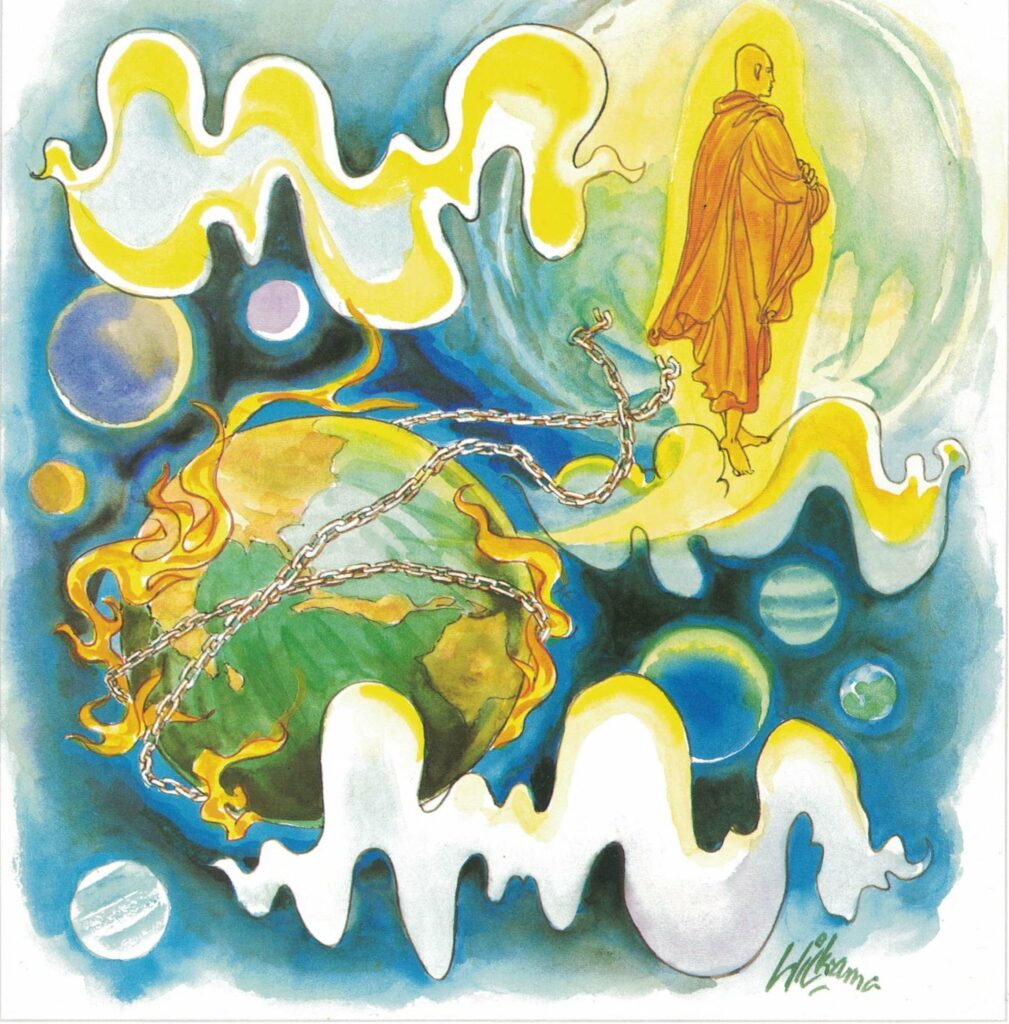Pali text, illustration and English translation of Dhammapada verse 90:
gataddhino visokassa vippamuttassa sabbadhi |
sabbaganthappahīṇassa pariḷāho na vijjati || 90 ||
90. With journey finished and sorrowless, from everything completely free, for one who’s loosened all the ties passion’s fever is not found.

The Story of the Question Asked by Jīvaka
While residing at the mango-grove Monastery of Jīvaka, the Buddha spoke this verse, with reference to the question raised by Jīvaka to the Buddha.
Now on a certain occasion Devadatta joined forces with Ajātasattu, climbed Vulture Peak, and out of the wickedness of his heart, saying to himself, “I will kill the Buddha,” hurled down a rock. Two mountain crags caught the rock and splintered it; but one of the flying pieces struck the foot of the Buddha and caused blood to flow. The Buddha suffered intense pains and was removed by the monks to Maddakucchi. Desiring to go on to Jīvaka’s Mango-grove, the Buddha said to the monks, “Carry me thither.” So the monks took the Buddha and carried him to Jivaka’s Mango-grove. When Jīvaka heard the news, he immediately went to the Buddha and to heal the wound applied an ointment. Then he bound up the wound and said to the Buddha, “Venerable, I have a patient in the city. As soon as I have visited him, I will return. Let this dressing remain exactly as it is until I return.” So saying, Jīvaka went and treated his patient. But the gate was closed when he returned, and he was therefore unable to enter. Thereupon the following thought occurred to him, “I have committed a grievous fault. I applied an astringent to the foot of the Buddha and bound up his wound, just as I should have bound up the wound of any other man. It is now time to remove the bandage. For if the bandage remains unbound all night long, the Buddha will suffer intense pain.”
At that moment the Buddha addressed the Venerable Ānanda, “Ānanda, Jīvaka returned late in the evening and was unable to enter the gate. This was the thought in his mind, ‘Now it is time to remove the bandage.’ Therefore remove the bandage, whereupon the scar disappeared like bark from a tree. At early dawn Jīvaka hastened to the Buddha’s side and asked, “Venerable, did you suffer intense pain?” Said the Buddha, ‘Jīvaka, all suffering is extinguished for the Buddha, even as when he sat on the Throne of Enlightenment.”
Explanatory Translation (Verse 90)
gataddhino visokassa sabbadhi vippamuttassa
sabbaganthappahīnassa pariḷāho na vijjati
gataddhino [gataddhina]: those who are at journey’s end; visokassa: sorrowless; sabbadhi: in all things; vippamuttassa: fully released; sabbaganthappahīnassa: have totally freed themselves from all bonds; pariḷāho [pariḷāha]: anxiety; na vijjati: (in them) does not occur
They are at the journey’s end–their quest for liberation has succeeded. They are sorrowless and are totally released in mind. They have got rid of all knots and no bonds bind them. In them no anxiety exists.
Commentary and exegetical material (Verse 90)
gataddhino: he who has fully travelled the road, who has gone all the way–and that person is the arahat. There are two roads that can be taken by humans. One is the wilderness road. The other is the road through succeeding cycles of existence–which is saṃsāra. The wilderness roads are of five types. One is the bandit Wilderness which is dominated by plundering and murdering bandits. The second is the wilderness of wild beasts. The ferocious beasts hold sway over it. The third is the waterless wilderness where there is no water for drinking or washing. The fourth is the Wilderness of non-human and sub-human species. That kind of Wilderness is dominated by devils and demons. The fifth is the foodless wilderness. There, no edible things are found. But when the arahats are described as gataddhino–those who have travelled the road–what is meant is the road through the cycle of existence. The arahats have completed their journey through it–Saṃsāra.
sabba ganthappahīnassa: to him who has given up all bonds. Bonds are four in number. They are:
- abhijjhā: covetousness: desiring the possessions of others;
- vyāpāda: ill-will;hatred, resentment and anger towards others;
- silabbata-parāmāsa: alienated discipline;
- idam saccābhiniveso [saccābhinivesa]: the bias that what I hold is entirely true and all others are untrue.
These four bonds keep a person shackled to recurrent existence (saṃsāra).
Jīvaka: personal physician of the Buddha. The Buddha pronounced this stanza for Jīvaka. Immediately after his birth Jīvaka was placed in a casket and was cast away by his mother, a courtesan, on a dust heap by the road side. Prince Abhaya, a son of King Bimbisāra, who happened to pass that way, saw the helpless infant surrounded by crows, and discovering that he was alive (jīvati), caused him to be given to the care of the nurses. As he was found alive he was named Jīvaka. Being adopted by a prince, he was called Komārabhacca. Growing up, he became a skilful physician and surgeon. Books state that he made two successful operations on a millionaire who was suffering from a severe headache. He used to attend on the Buddha three times a day. When, in this instance, the Buddha’s foot was wounded by a splinter caused by the hurling of a rock by Devadatta, it was Jīvaka who attended on Him and healed Him.